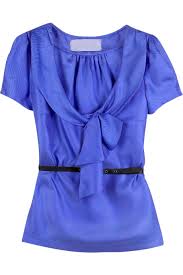记忆方法
联想记忆法:“blouse”可以想象为“blue(蓝色)”的“ouse(house的后缀,表示房屋)”,想象一个蓝色的房子,即“蓝房子”,这里的“蓝房子”代表的就是“blouse”(女式衬衫)。通过这种颜色和物体形状的结合,可以帮助记住单词“blouse”。
以上内容由AI生成, 仅供参考和借鉴
中文词源
blouse 女式衬衫
来自法语,词源不详。
英语词源
- blouse (n.)
- 1828 (from 1822 as a French word in English), from French blouse, "workman's or peasant's smock" (1788), origin unknown. Perhaps akin to Provençal (lano) blouso "short (wool)" [Gamillscheg]. Another suggestion [Klein] is that it is from Medieval Latin pelusia, from Pelusium, a city in Upper Egypt, supposedly a clothing manufacturing center in the Middle Ages.
In Paris, a very slovenly, loose, drawn frock, with most capacious sleeves, had been introduced called a blouse. Some of our priestesses of the toilet seemed emulous of copying this deshabille, with some slight alterations, but we never wish to see it on the symmetrical form of a British lady. ["Summary of Fashion for 1822," in "Museum of Foreign Literature and Science," Jan.-June 1823]
权威例句
- 1. She was wearing a white ruffled blouse and a blue velvet skirt.
- 她穿着一件有花边的白色上衣和一条蓝色天鹅绒裙子。
- 2. I always spatter my blouse with gravy when I eat.
- 吃饭的时候,我总是把肉汁溅到衬衣上。
- 3. She had begun to unbutton her blouse.
- 她开始解衬衣扣子。
- 4. a filmy cotton blouse
- 薄如蝉翼的女棉衬衫
- 5. a white blouse with frills at the cuffs
- 袖口上有褶边的女衬衫
